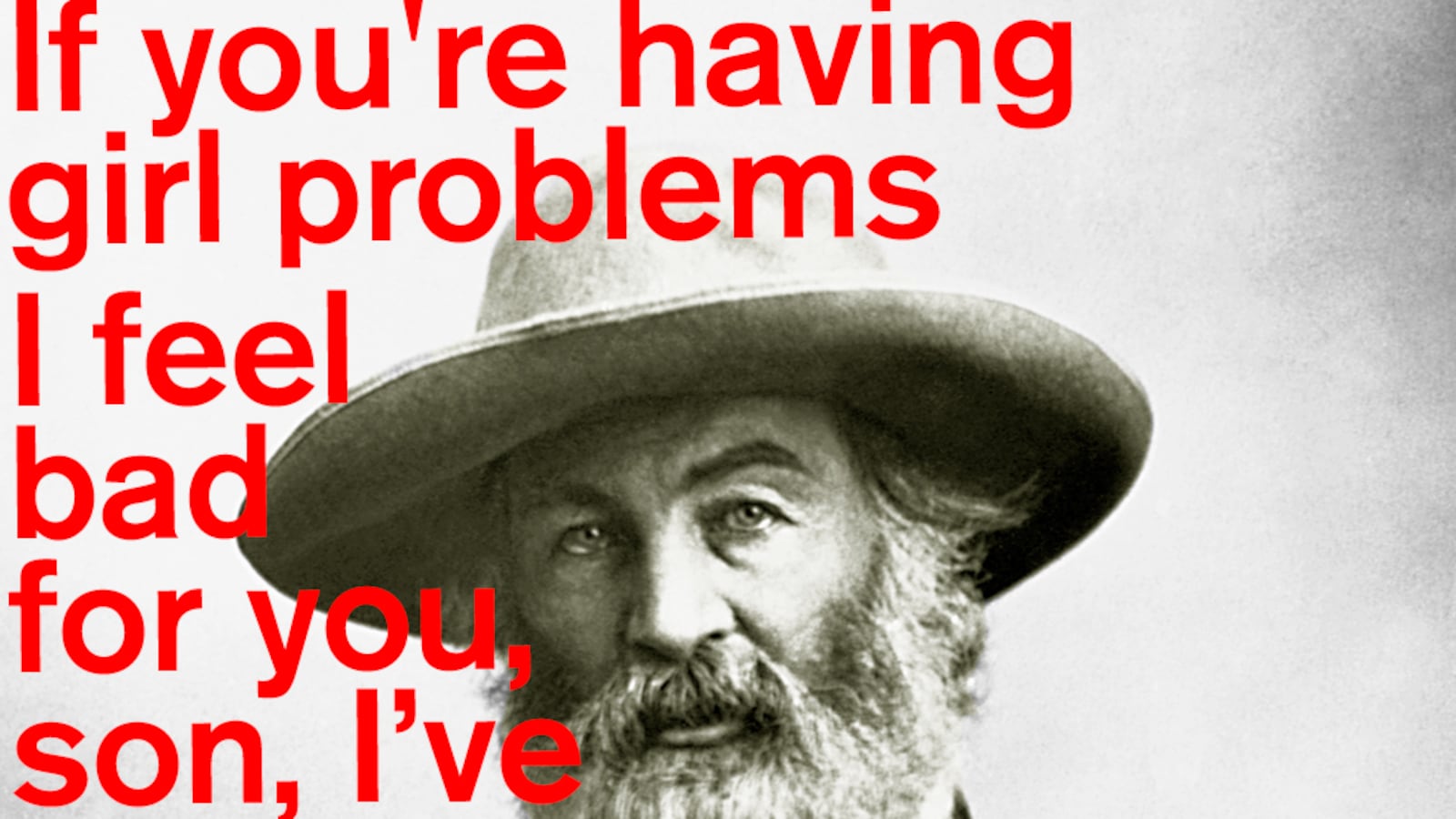One hears a certain baleful cry regularly in writerly circles that Americans don’t care about poetry anymore. A widely read Atlantic piece by Dana Gioia in 1992 was a signature statement. Granted, that was a while ago now, but times don’t seem to have changed much: Comments in the wake of Charles Wright’s anointment last week as America’s poet laureate kept the lamentation going.
The drill goes that back in the day, kids recited Longfellow in school, but today poets are a tiny guild writing largely for one another. Americans, anti-intellectual and numb to the artistic as always, have become a people deaf to heightened renditions of their language.
It sounds right. I myself a long time ago even threw my hat in on the subject. But the whole notion is, in fact, nonsense.
To utterly naïve anthropologists sent to document the ways of Americans in 2014, one of the first things that would strike them is that this country is quite poetry mad. No, they would not find well-thumbed volumes of Robert Frost, Marianne Moore, and Billy Collins laying around the typical living room. However, they could not help but notice that a great many people under about 50 regularly go around listening to and yes, reciting poetry—rap, that is.
Rap is indeed “real” poetry. It rhymes, often even internally. Its authors work hard on the lyrics. The subject matter is certainly artistically heightened, occasioning long-standing debates over whether the depictions of violence and misogyny in some of it are sincere. And then, that “gangsta” style is just one, and less dominant than it once was. Rap, considered as a literature rather than its top-selling hits, addresses a wide-range of topics, even including science fiction. Rap is now decades old, having evolved over time and being increasingly curated by experts. In what sense is this not a “real” anything?
The only reason rap may seem to nevertheless not be “real” poetry is a skewed take on language typical of modern, literate societies: that spoken language is merely a sloppy version of written language. “English,” under this analysis, is what’s on a page, with punctuation and fonts and whoms and such. Speech is “just talking.”
That means that to us, poetry is written poetry, that which sits between covers and is intended to be read, quietly, alone, with tea, likely chamomile. Never mind that in fact Jay-Z has released a magisterial volume of his lyrics as a book: generally, rap is intended to be heard on the fly, often in a concert arena. Surely there is a key distinction between that and the strophes of John Berryman or Gwendolyn Brooks?
But if there is, it’s a matter of style and tone, not basic classification. Partly because of its orality and partly because it is so relentlessly “of our times,” rap tends to be profane—but profanity does not disqualify something as poetry. One might not like poetry laced with profanity—but that’s something different, and quite frankly most of young America likes it just fine, just crazy about the poetry they have grown up with.
Overall the idea that poetry is serious only if it’s on a page and read with tea is actually rather parochial. An epic like Beowulf was composed for the ear, with careful alliterations within each line. Somalians’ poetry, again, written down only as an afterthought by outside observers, has such intricate rules that to us it seems more like a puzzle than art. Spoken is not broken.
America, then, has no real interest in written poetry. And it’s certainly true that old timers were taught to recite “Casey at the Bat” in school, that Edna St. Vincent Millay had a national radio show for a while, that the culturally aspiring twenty-something once often had Louis Untermeyer’s poetry anthology on their bookshelf, that Marianne Moore did some appearances on the “Tonight Show.”
Today, okay, Billy Collins has achieved a kind of household status if NPR-listening, New Yorker-reading people count as “household.” But his embrace by the collegetown crowd is something different from the old days when newspapers regularly solicited light poetry just to fill empty spaces on pages.
The real story is that modern technology and social media make us a much more oral society than we once were. Naturally poetry will be delivered more through the ear than through the eye—just as it was for most of human history, and still is in most of the world’s 6,000 languages, only about a hundred of which are written in any real way.
And it doesn’t help that modern poetry is often intentionally something other than comfort food. Without rhyme or regular meter, embracing ambiguity and often deeply individualistic, much of it almost willfully transcends the bounds of popular taste. Lamenting that America doesn’t cherish poetry like this is like wondering why Milton Babbitt, Thomas Pynchon and Ornette Coleman aren’t common coin.
Overall, today’s young person can often recite just as much poetry as her grandfather could, and likely spends a lot more of her spare time engaging it—only with earbuds on rather than with her hands around a mug of tea on a rainy afternoon. “And every fair from fair sometimes declines,” Shakespeare once told us, but when it comes to poetry, it would appear that America’s “eternal summer shall not fade” after all.





